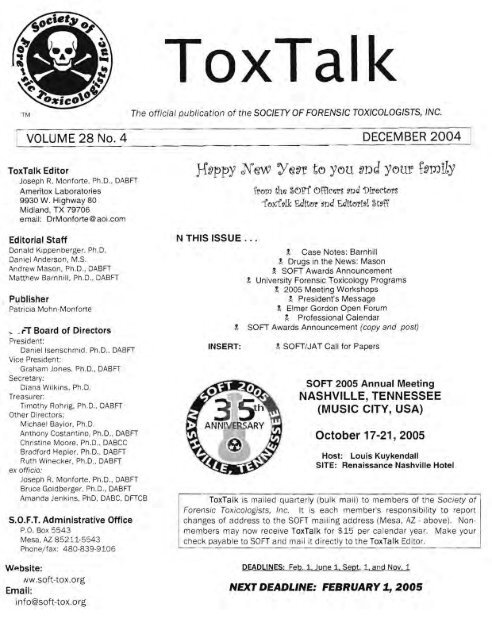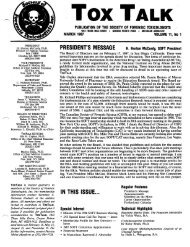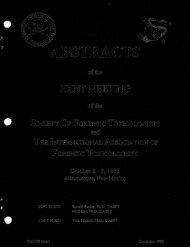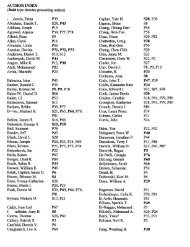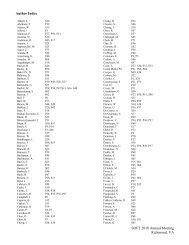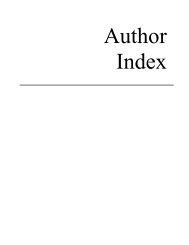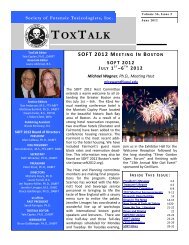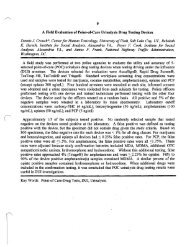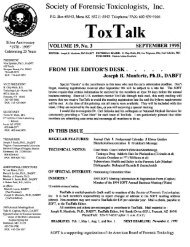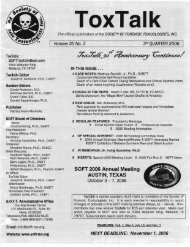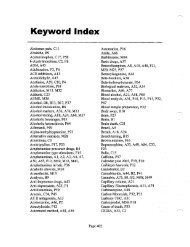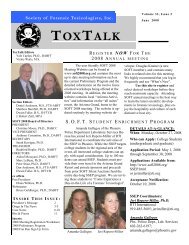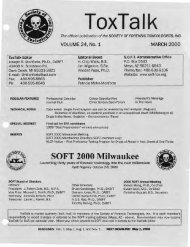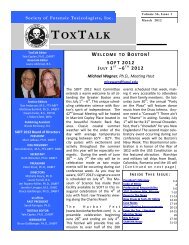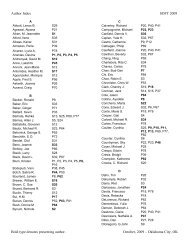ToxTalk Volume 28-4 - Society of Forensic Toxicologists
ToxTalk Volume 28-4 - Society of Forensic Toxicologists
ToxTalk Volume 28-4 - Society of Forensic Toxicologists
Create successful ePaper yourself
Turn your PDF publications into a flip-book with our unique Google optimized e-Paper software.
<strong>ToxTalk</strong> <br />
TM<br />
I VOLUME <strong>28</strong> No.4<br />
The <strong>of</strong>ficial publication <strong>of</strong> the SOCIETY OF FORENSIC TOXICOLOGISTS, INC.<br />
DECEMBER 2004 <br />
<strong>ToxTalk</strong> Editor<br />
Joseph R. Monforte, Ph.D ., DABFT<br />
Ameritox Laboratories<br />
9930 W. Highway 80<br />
Midland, TX 79706<br />
email: DrMonforte@aol.com<br />
Editorial Staff<br />
Donald Kippenberger. Ph .D. <br />
Daniel Anderson, M.S. <br />
Andrew Mason, Ph.D .. DABFT <br />
Matthew Barnhill, Ph.D ., DABFT <br />
Publisher<br />
PatriCia Mohn-Monforte<br />
~ _r"T Board <strong>of</strong> Directors<br />
President: <br />
Daniel Isenschmid. Ph .D .. DABFT <br />
Vice President: <br />
Graham Jones. Ph .D., DABFT <br />
Secretary: <br />
Diana Wilkins, Ph.D. <br />
Treasurer: <br />
Timothy Rohrig, Ph.D .. DABFT <br />
Other Di rectors: <br />
Michael Baylor, Ph .D. <br />
Anthony Costantino, Ph.D .. DABFT <br />
Christine Moore. Ph.D. , DABCC <br />
Bradford Hepler. Ph.D .. DABFT <br />
Ruth Winecker, Ph.D .. DABFT <br />
ex <strong>of</strong>ficio:<br />
Joseph R. Monforte. Ph .D., DABFT<br />
Bruce Goldberger. Ph.D., DABFT<br />
Amanda Jenkins, PhD, DABC, DFTCB<br />
S.O.F.T. Administrative Office<br />
P.o. Box 5543 <br />
Mesa. AZ 85211-5543 <br />
Phone/ fax: 480-839-9106 <br />
Wp.bsite:<br />
NW .S<strong>of</strong>t-tox.org<br />
Email:<br />
info@s<strong>of</strong>t-tox.org<br />
N THIS ISSUE ...<br />
INSERT:<br />
tfe>PJ the ~(')ti (')ffieers :md 'Directe>fs<br />
Te>x:IfJ!,k, E.ditC>1~ :md E.dite>fifJL ~tfJtt<br />
:!: Case Notes: Barnhill<br />
:!: Drugs in the News: Mason<br />
:!: SOFT Awards Announcement<br />
:t University <strong>Forensic</strong> Toxicology Programs<br />
:!: 2005 Meeting Workshops<br />
:t President's Message<br />
:!: Elmer Gordon Open Forum<br />
:!: Pr<strong>of</strong>essional Calendar<br />
:!: SOFT Awards Announcement (copy and post)<br />
,!: SOFT/JAT Call for Papers<br />
SOFT 2005 Annual Meeting<br />
NASHVILLE, TENNESSEE<br />
(MUSIC CITY, USA)<br />
October 17-21, 2005<br />
Host: Louis Kuykendall<br />
SITE: Renaissance Nashville Hotel<br />
<strong>ToxTalk</strong> is mailed quarterly (bulk mail ) to members <strong>of</strong> the <strong>Society</strong> <strong>of</strong><br />
<strong>Forensic</strong> <strong>Toxicologists</strong>, Inc. It is each member's responsibility to report<br />
changes <strong>of</strong> address to the SOFT mailing address (Mesa, AZ - above). Nonmembers<br />
may now receive <strong>ToxTalk</strong> for $15 per calendar year. Make your<br />
check pa yable to SOFT and mail it directly to the <strong>ToxTalk</strong> Editor.<br />
DEADLINES: Feb. 1, June 1. Sept. 1. and Nov. 1<br />
NEXT DEADLINE: FEBRUARY 1, 2005
PRESIDENT.S MESSAGE<br />
Daniel Isenschmid, Ph.D., DABFT<br />
As I write this final President's message, I would like to take the opportunity to thank the<br />
membership <strong>of</strong> SOFT for giving me the honor to have served as an Officer and Director<br />
<strong>of</strong> the organization since 1996. I would particularly like to thank all <strong>of</strong> the Board members<br />
and Committee Chairpeople, past and present, for their commitment to SOFT and all <strong>of</strong><br />
their help . In particular, I would like to thank Past Presidents Laurel Farrell and Amanda<br />
Jenkins as well as current Officers, Graham Jones, Diana Wilkins and Tim Rohrig for<br />
their assistance, advice and friendship.<br />
One <strong>of</strong> the problems with thanking anyone by name is you run into the inevitable problem <strong>of</strong> not including<br />
everyone that you want to include. However, I would like to extend thanks to five people who helped shape my interest<br />
and appreciation for forensic toxicology. First, I would like to thank Jesse Bidanset. If he had not taught an elective<br />
course that introduced me to forensic toxicology, I probably would never have been writing this. I will always remember<br />
his take-home exam that not only asked for essays on "reverse tolerance" and "extraction flow charts" but also had us<br />
choose a phenothiazine and indicate the "possible" metabolites. For some reason , I chose chlorpromazine. (I think I<br />
came up with 168 possible metabolites). After this introduction to forensic toxicology I knew I wanted to pursue my<br />
graduate education in a setting that would also allow me to gain experience in a post mortem toxicology laboratory.<br />
Fortunately, under the direction <strong>of</strong> Yale Caplan, my mentor and friend, I had that opportunity - certainly one I thank him<br />
for. I was also very lucky to have had the opportunity to attend graduate school with great classmates - Donna Bush,<br />
Anthony Costantino and Bruce Goldberger. Trust me, it's easier to study for comprehensive examinations with friends.<br />
In thinking about my final comments to you as President <strong>of</strong> SOFT, I realized that I felt it was important for me to<br />
convey that I love and respect the field <strong>of</strong> forensic toxicology. I enjoy the underpinning analytical aspects, but especially<br />
recognize the interpretive issues that invariably accompany a result. However, as I indicated during the annual business<br />
meeting, I have some concerns about some <strong>of</strong> the recent directions our field is going in.<br />
There have always been new "challenges or issues" in forensic toxicology: postmortem redistribution, drug<br />
stability, amphetamine artifacts from ephedrines, poppy seed, hemp and coca-tea issues, and today pharmacogenomic<br />
issues. However, these are all either analytical or interpretive issues that involved us as forensic toxicologists. One <strong>of</strong> our<br />
current problems, however, is not a laboratory problem - but laboratories got stuck with it. That problem is not<br />
determining what drugs are in a urine specimen, but determining whether it is a urine specimen at all. Frankly,<br />
determining whether something is urine is not forensic toxicology. It's not that I don't think laboratories aren't capable <strong>of</strong><br />
answering that question. However, they should not have to. Are we focused too much on administrative or technical<br />
minutia, which detract from our fundamental and principal role as interpretive scientists, explaining the why after<br />
determining the what It is my hope that, down the road, this issue will be addressed, whether through the use <strong>of</strong><br />
alternative matrices or through other means such as prohibiting the sale <strong>of</strong> adulterants, to ensure that laboratories<br />
receive a valid specimen so we can return to our primary purpose .<br />
Thanks again to everyone for their support! This is a great organization, and I am proud to be a part <strong>of</strong> it. ~<br />
2005 SOFT/JAT Special Issue<br />
Dr. Jeri Ropero-Miller<br />
2005 Special Issue Editor<br />
See flyer with this issue <strong>of</strong><br />
<strong>ToxTalk</strong><br />
TOXTALK CONTACTS:<br />
EDITOR - Dr. Joseph R. Monforte at<br />
DrMonforte@aol.com<br />
"New Drugs" - Daniel Anderson at<br />
Oanderson@lacoroner.org<br />
"Drugs in the News' - Dr. Andrew Mason at<br />
form6tox@aol.com<br />
"Case Reports"- Dr. Matthew Barnhill at<br />
mbarnhi/ljr@worldnet.aft.net<br />
<strong>ToxTalk</strong> <strong>Volume</strong> <strong>28</strong> No.4 December 2004
Jbmitted by Yale H. Caplan, ABFT President<br />
A.B.F.T. NEWS <br />
The American Board <strong>of</strong> <strong>Forensic</strong> Toxicology has recently adopted this mission statement: <strong>Forensic</strong> toxicology<br />
encompasses the measurement <strong>of</strong> alcohol, drugs and other toxic substances in biological specimens and interpretation <strong>of</strong><br />
such results in a medico-legal context. The purpose <strong>of</strong> the American Board <strong>of</strong> <strong>Forensic</strong> Toxicology is to establish and<br />
enhance voluntary standards for the practice <strong>of</strong> forensic toxicology and for the examination and recognition <strong>of</strong> scientists and<br />
laboratories providing forensic toxicology services.<br />
CERTIFICATION PROGRAM - New Diplomates in 2004 are: George Behonick, Diana Garside, Loralie<br />
Langman, Jeri Ropero Miller, Ruth W. Winecker and John Wyman. Fourteen diplomates were requalified in 2004: William C.<br />
Bress, Bruce A. Goldberger, William D. Hemphill, George F. Jackson, Graham R. Jones, Raymond C. Kelly, Andrew P.<br />
Mason, Robert C. Meatherall, James E. Meeker, Lance C. Presley, Timothy P. Rohrig, Thomas G. Rosano, James A. Ruth<br />
and Karl G. Vereby. New <strong>Forensic</strong> Toxicology Specialists in 2004 are: Christopher Cording, Deborah Denson and Xiang<br />
Zhang. Currently there are 138 Diplomates, 21 Specialists and 24 Emeritus Certificants.<br />
LABORATORY ACCREDITATION PROGRAM - 16 laboratories have successfully completed the ABFT<br />
Laboratory Accreditation Program. The most recent laboratory in 2004 is Harris County Medical Examiners Toxicology<br />
Laboratory, Houston, TX, Ashraf Mozayani, Ph.D., DABFT, Director. The laboratory accreditation program requires reaccreditation<br />
every two years. The forensic toxicology laboratories completing re-accreditation in 2004 are Monroe County<br />
Medical Examiner's Office, New York, Suffolk County OCME, New York, Erie County OCME, New York, and OCME, Alberta,<br />
Canada. Several additional laboratory applications are under consideration , and we expect to reach 20 laboratories<br />
accredited in 2005.<br />
CONTINUING EDUCATION PROGRAM - CE time is here. The annual submission form and instructions will<br />
arrive by mail during the first week in January and will also be available on the ABFT website at www.abft.org. The form is<br />
due March 1, 2005.<br />
ABFT BREAKFAST - The 1ih annual breakfast was held in conjunction with the SOFTmAFT/FBI meeting in<br />
Washington , DC. Over 60 Certificants attended.<br />
ABFT NOMINATING COMMITTEE - Secretary Isenschmid is chair <strong>of</strong> the committee. Two new Diplomates<br />
- "">pointed this year are Barry Levine and Richard Shaw. Additional members continuing are Michael Peat, Joseph Manno,<br />
Id Michael Smith. ~<br />
DON'T FORGET TO CHECK THE SOFT WEB SITE www.s<strong>of</strong>t-tox.org<br />
for the latest information regarding SOFT activities. Unauthorized access or printing is protected by copyright laws.<br />
AAFS TOXICOLOGY SECTION NEWS <br />
Updated AAFS Drug Mass Spectral Library<br />
Submitted by Graham R. Jones, Ph .D., DABFT, Chair, AAFS Mass Spectral Database Committee,<br />
grahamjones@gov.ab.ca<br />
Many <strong>of</strong> you will be pleased to know that a long-overdue update to the AAFS Mass Spectra Database has been<br />
uploaded to the web. The library now has about 2260 entries, an increase <strong>of</strong> about 400 over the previous version . New<br />
drugs include 5-methoxy-N,N-dimethyltryptamine, 5-methoxy-N ,N-dipropyltryptamine, atomoxetine, betaxolol, bisoprolol,<br />
colchicine, efavirenz, fex<strong>of</strong>enadine, fluconazole, flumazenil , modafinil, prop<strong>of</strong>ol and tioconazole. As before, the update is<br />
available as a standalone "update" library, and as the cumulative main AAFSDRUG library. The library is still housed at my<br />
account at the University <strong>of</strong> Alberta. However, we hope to provide a link from the SOFT web site in the near future.<br />
The address <strong>of</strong> the web site is http://www.ualberta.cal-gjones/mslib.htm<br />
As before, one <strong>of</strong> the main difficulties in building a timely update to the library is obtaining standards <strong>of</strong> new drugs <br />
espeCially <strong>of</strong> unusual or controlled drugs. If anyone can provide methanolic solutions <strong>of</strong> relatively new or unusual drugs<br />
~preferable) , or electronic files <strong>of</strong> full scan MS data (AgilentlHP format) , that would greatly facilitate providing timely<br />
ldates. If you would like advice on how to save and transfer MS data files or spectra, please contact me.<br />
I am extremely grateful for the assistance <strong>of</strong> the toxicology staff <strong>of</strong> the RCMP <strong>Forensic</strong> Laboratory in Winnipeg, Bob<br />
Meatherall in Winnipeg and Dan Anderson in Los Angeles, for providing standards for the August 2004 update. ~<br />
<strong>ToxTalk</strong> <strong>Volume</strong> <strong>28</strong> No.4 De cember 2004 3
THREE CHEERS FOR SOFT VENDORS! <br />
lubmitted by Lisa O'Dell, SOFT Vendor Liaison<br />
Extraordinary gratitude and considerable recognition must be given to the exhibitors, sponsors and advertisers<br />
for their financial assistance <strong>of</strong> the Joint Meeting <strong>of</strong> SOFT and TIAFT in Washington, DC. Together, they accounted for<br />
unparalleled contributions in financial and scientific support to this year's spectacular meeting. Their monetary<br />
contributions include leasing booths; sponsoring meals, breaks, and evening events; and advertising in the meeting<br />
program. In addition, many companies contribute quality science to the meeting by presenting papers, posters, and<br />
workshops. With their continued and generous assistance, the SOFT Annual Meeting firmly remains the most prestigious<br />
toxicology meeting in the world.<br />
Please be sure to explore the following company hyperlinks on the SOFT website (s<strong>of</strong>t-tox.org, 2004 Annual<br />
Meeting Exhibitors, Sponsors, and Advertisers) and when doing so, take a moment from your day to acknowledge these<br />
companies in some personal way.<br />
Accu-Chem Laboratories Draeger Safety Diagnostics Quality Assurance Service<br />
Aegis Sciences Corporation Elsevier Quality <strong>Forensic</strong>s / FITZCO<br />
Agilent Technologies EnviteC-Wismar GmbH Randox Laboratories<br />
Alternative Biomedical Services Excalibur Lab Specialists / DCI Reichert, Inc.<br />
American Bio Medica Hamilton Company Restek Corporation<br />
American Solutions for Business Humana Press Roche Diagnostics Corporation<br />
Applied Biotech Immunalysis Corp. Rudolph Research Analytical<br />
Axiom Diagnostics International Diagnostic Systems Scienta International<br />
Biochemical Diagnostics Journal <strong>of</strong> Analytical Toxicology Sciteck, Inc.<br />
Bio-Rad Laboratories Lampire Biological Laboratories Shamrock Glass Company<br />
Branan Medical Lawyers & Judges Publi~hing Shimadzu Scientific Instruments<br />
Campbell Science Lin-Zhi International SPEware<br />
Capitol Vial Lipomed Syntron Bioresearch<br />
Cerilliant Corporation Lynn Peavey Company Taylor & Francis Books<br />
ChemWare Microgenics Corporation Teledyne Tekmar<br />
Clinical Controls International Microliter Analytical Supplies Thermo Electron<br />
CMI , Inc. National Medical Services Toxicological Sciences<br />
Common Cents Systems Neogen Corporation United Chemical Technologies<br />
Cozart Bioscience OraSure Technologies UTAK Labs<br />
Dade Behring PerkinElmer Life & Analytical Varian, Inc.<br />
Data Unlimited International Sciences Venture Labs<br />
domnick hunter Pharmaceutical Press. VertiQ S<strong>of</strong>tware<br />
Porter Lee Corporation<br />
Waters Corporation<br />
Companies interested in participating in the SOFT 2005 Annual Meeting in Nashville, TN<br />
should contact Lisa O'Dell at NomadLee9@ao/.com for details. :!:<br />
NEW TOXTALK EDITOR CONTACT INFORMATION - Reminder<br />
Dr. Joseph R. Monforte, SOFT <strong>ToxTalk</strong> Editor, has left Arizona to join the staff at Ameritox Laboratories. <br />
It is recommended that materials for <strong>ToxTalk</strong> be sent via e-mail. If you must send items by mail, send to: <br />
Joseph R. Monforte, Ph.D., DABFT, Laboratory Co-Director <br />
Ameritox Laboratories, LLC, 9930 W. Highway 80, Midland, TX 79706 <br />
Phone: 915·561·5091 Fax: 915·561·8619 <br />
email: DrMonforte@aol.com <br />
Please continue to send material for <strong>ToxTalk</strong> directly to the appropriate Editorial Staff person.<br />
<strong>ToxTalk</strong> <strong>Volume</strong> <strong>28</strong> No.4 December 2004
SOFT 2005 Annual Meeting<br />
MUSIC CITY, USA<br />
NASHVILLE, TENNESSEE<br />
October 17-21, 2005<br />
HOST: Louis Kuykendall<br />
SITE: Renaissance Nashville Hotel<br />
The 2005 SOFT conference will be held in the Renaissance Nashville Hotel, situated downtown in the very center<br />
<strong>of</strong> Nashville's dual-personality as " The Athens <strong>of</strong> the South" and "Music City, USA". The Renaissance Nashville<br />
Hotel (615.255.8400 or 800-HOTELS-1) will accept reservations as <strong>of</strong> November 10, 2004. For the $149<br />
single/double convention rate use meeting code "SOFT Conference". The meeting will consist <strong>of</strong> workshops on<br />
Monday and Tuesday (details below) with general sessions and posters Wednesday through Friday. An exciting<br />
social program will soon be finalized .<br />
PRELIMINARY WORKSHOP PROGRAM <br />
#1 <strong>Forensic</strong> Toxicology <strong>of</strong> Pesticides (1/2 day) Chair:<br />
Maria Martinez<br />
This workshop will be a discussion <strong>of</strong> pesticides in forensic<br />
toxicology, including a general overview <strong>of</strong> pesticides.<br />
analytical methods, and interpretation <strong>of</strong> analytical toxicology<br />
findings. Pesticides are used extensively in agriculture,<br />
commercial and industrial applications, and some <strong>of</strong> them<br />
are resistant to degradation. As a consequence they are<br />
ubiquitous in our environment. Incidence <strong>of</strong> poisoning with<br />
these chemicals will be also considered. A series <strong>of</strong> clinical<br />
and forensic cases involving pesticide poisoning will be<br />
presented. Finally, diagnosis and treatment <strong>of</strong> pesticide<br />
poisonings will be discussed.<br />
#2 Interpretive Pharmacogenomics and Proteomics for<br />
<strong>Forensic</strong> Toxicology (1/2 day) Chair: Steve Wong<br />
The workshop is an update <strong>of</strong> a previous workshop. In<br />
addition to a brief introduction to molecular biology, the<br />
workshop will include basic principles <strong>of</strong> pharmacogenomics<br />
and the emerging proteomics. A survey <strong>of</strong> various<br />
methodologies will be included . The pharmacogenomics <strong>of</strong><br />
drug metabolizing enzyme genes will be reviewed, with<br />
particular reference to those related to drugs <strong>of</strong>ten identified<br />
in death certification. The session might include precollection<br />
<strong>of</strong> attendees' whole blood with informed consent,<br />
followed by genotyping. The de-identified results will be<br />
included in the presentation in order to demonstrate mutation<br />
prevalency in a selected population - the attendees. The<br />
workshop will conclude with selected case review with<br />
pharmacogenomics.<br />
FOR INFORMATION ON MANY NASHVILLE <br />
ATTRACTIONS <br />
GO TO WWW.MUSICCITYUSA.COM <br />
#3 Blood Alcohol Concentration Extrapolation Workshop<br />
(1 /2 day) Chair: Jennifer F. Limoges<br />
This half-day workshop will cover all aspects <strong>of</strong> BAC<br />
extrapolation. The pharmacokinetics <strong>of</strong> ethanol will be<br />
reviewed in depth, including calculations for estimating BAI<br />
under a variety <strong>of</strong> circumstances. Factors that may effec.<br />
BAC estimations will be covered, along with an update <strong>of</strong> the<br />
legal issues surrounding this type <strong>of</strong> testimony. The<br />
workshop will conclude with an open discussion on some<br />
challenging case scenarios . Extensive reference materials<br />
will be provided.<br />
#4 Receptor Site Theory and Drug Interactions (1/2 day)<br />
Chair Robert Sears<br />
The SOFT Continuing Education Committee presents a<br />
Workshop on Receptor Site Theory and Drug Interactions.<br />
This workshop is designed for the toxicologist working in a<br />
post-mortem or human performance setting. The participant<br />
will have a better understanding <strong>of</strong> various receptor sites in<br />
the body, physiological effects mediated by these receptors,<br />
and which drugs act as agonist or antagonist at these sites.<br />
As a result the toxicologist will better be able to assist<br />
coroners, medical examiners, and prosecutors with<br />
interpretation <strong>of</strong> the toxicology results especially as these<br />
results relate to multiple drug interactions and prediction <strong>of</strong><br />
adverse side effects. The workshop will include a review <strong>of</strong><br />
information related to the characterization <strong>of</strong> select receptor<br />
sites, specific information as to the location and the<br />
physiological effects mediated by the receptor, information<br />
on specific drugs or poisons known to act at the receptor,<br />
and resultant physiological changes due to drug-receptor _<br />
interactions.<br />
<strong>ToxTalk</strong> <strong>Volume</strong> <strong>28</strong> NO.4 Oecember 2004 6
#5 Oral Fluids - Research and Application (1/2 day)<br />
Chair: Mike Wagner<br />
The focus <strong>of</strong> this workshop will cover such topics as basic<br />
'siology, drug transport mechanisms, time course pr<strong>of</strong>iles,<br />
.:!rpretation issues (pharmacodynamic and behavioral<br />
observations), matrix correlations (oral fluid, blood, urine,<br />
and site contamination), analytical issues (stability, sample<br />
preparation, and instrumental analysis), and field evaluation<br />
studies.<br />
#6 <strong>Forensic</strong> Toxicology Update (full day)<br />
Chair: John Cody<br />
This workshop will describe the analysis <strong>of</strong> drugs and alcohol<br />
from the perspective <strong>of</strong> post-mortem , DUID and workplace<br />
drug testing. The format will include a quick review followed<br />
by pertinent updates describing new information and<br />
techniques in the area. Topics covered will include each <strong>of</strong><br />
the major drug classes and ethanol. Presentations will<br />
include a brief review <strong>of</strong> the pharmacology <strong>of</strong> the drug (class)<br />
followed by description <strong>of</strong> the analysis <strong>of</strong> samples and<br />
interpretation <strong>of</strong> results. Specific examples <strong>of</strong> particular<br />
interest to the forensic toxicology community will be<br />
presented by experienced practitioners providing insights<br />
borne <strong>of</strong> years <strong>of</strong> experience in the field . In addition,<br />
discussion <strong>of</strong> emerging procedures and technologies will<br />
provide a glimpse <strong>of</strong> the future <strong>of</strong> forensic toxicology.<br />
#7 From "Sample to Signal; Practical LC/MS n ,,: An<br />
introduction to fundamental LC/MS/MS technologies and<br />
p.ractical practices in <strong>Forensic</strong> Toxicology. Chair: H. Chip<br />
lis<br />
I "is workshop provides an understanding <strong>of</strong> the key<br />
components <strong>of</strong> LC/MS n instrumentation, operation,<br />
advantageous features, and the information derived from<br />
analysis. The conversion <strong>of</strong> LC/UV methods to LC/MS n will<br />
be covered. Performance characteristics <strong>of</strong> mass analyzers<br />
and LC/MS n interfaces are described. <strong>Forensic</strong> applications<br />
<strong>of</strong> LC/MS n will be highlighted.<br />
#8 The Postmortem "Blood Drug Screen"; Analytical<br />
and Managerial Approaches (full day) Chair: Alphonse<br />
Poklis<br />
In the modern postmortem toxicology laboratory, the "Blood<br />
Drug Screen" is the most important analytical scheme to<br />
identify drugs that may be the cause <strong>of</strong> death or significantly<br />
influence the circumstances surrounding a death. This<br />
workshop will present in detail the analytical procedures in<br />
seven major postmortem toxicology laboratories. Formal<br />
lectures will address specific immunoassay tests and<br />
chromatographic methods including sample preparation,<br />
chromatographic conditions, calibrations and quality control<br />
procedures. At the completion <strong>of</strong> these presentations a<br />
round-table discussion will address the managerial rationale<br />
<strong>of</strong> how each laboratory applies it's particular analytical<br />
scheme in meeting the service objective <strong>of</strong> the laboratory.<br />
The round-table discussion will focus on management issues<br />
such as: result reporting criteria, personnel and laboratory<br />
resources, turn-around time and other issues.<br />
#9 Post Mortem Interpretation (full day)<br />
Chair Ann Marie Gordon & Rebecca Jufer<br />
The SOFT Continuing Education presents a Workshop on<br />
Post Mortem Interpretation . The workshop is designed for<br />
the toxicologist working in a post-mortem setting, and the<br />
participant will better be able to assist coroners and medical<br />
examiners with interpretation <strong>of</strong> the toxicology results. The<br />
workshop will include a review <strong>of</strong> pharmacokinetics, including<br />
how to calculate total body burden and what to do with the<br />
numbers. A discussion <strong>of</strong> post-mortem redistribution and<br />
other post-mortem changes will include an emphasis on<br />
newer antidepressants and opioids as well as how to<br />
compare the numbers in Baselt and Winek with data<br />
produced by your own lab. A review <strong>of</strong> drug-drug<br />
interactions will emphasize these phenomena in drug<br />
combination deaths. Also included will be a discussion <strong>of</strong><br />
alternative tissues, which tissues are likely to yield the best<br />
information for different kinds <strong>of</strong> investigations and how to<br />
interpret the data obtained from these tissues.<br />
#10 Case Studies in DUID: Numbers, Signs, Symptoms<br />
and Beyond (full day - 2 full-day sessions) Chair: Michelle<br />
Spirk & Sarah Kerrigan<br />
Driving under the influence <strong>of</strong> drugs (DUID) is <strong>of</strong> growing<br />
concern among the scientific, legal, law enforcement and<br />
public health communities. Although statutory schemes vary<br />
from state to state, toxicologists are <strong>of</strong>ten called upon to<br />
provide interpretive testimony in DUID cases. Pharmacology<br />
and behavioral toxicology studies provide the foundation for<br />
this, and these areas have been the focus <strong>of</strong> many earlier<br />
workshops and seminars on DUID.<br />
The purpose <strong>of</strong> this workshop is to highlight common<br />
interpretive issues using actual case stUdies. The presenters<br />
will apply their knowledge <strong>of</strong> drug pharmacology and<br />
behavioral toxicology in a case-oriented fashion. Driving<br />
behavior, observed effects and toxicology results will be<br />
presented for commonly encountered drugs including<br />
cannabinoids, methamphetamine, cocaine, opioids and<br />
central nervous system depressants. The workshop is<br />
intended to bridge the gap between the scientific literature<br />
and actual DUID casework. <strong>Toxicologists</strong> must be able to<br />
apply the scientific knowledge that exists to uncontrolled and<br />
non-scientific surroundings encountered in casework (urban<br />
and rural roadways) where environmental factors, injuries,<br />
drug combinations and other challenges are commonplace.<br />
Presenters will outline how to implement best practices and<br />
discuss interpretive limitations relating to matrix, delay in<br />
specimen collection, qualitative versus quantitative data as<br />
well as field observations and evaluations. Interpretative<br />
strategies and approaches will be discussed in addition to<br />
laboratory policies and guidelines that facilitate scientific<br />
testimony in a fair, objective and scientifically justified<br />
manner. ~<br />
MEETING DEADLINES WILL BE POSTED IN THE NEXT ISSUE OF TOXTALK <br />
AND ON THE SOFT WEB SITE <br />
<strong>ToxTalk</strong> <strong>Volume</strong> <strong>28</strong> NO.4 December 2004 7
CALL FOR CASE NOTES:<br />
Editorial Staff: Matthew "Barney" Barnhill, Ph.D.<br />
mbarnhilljr@worldnet.att.net<br />
If you have previously contributed a case note, thank you again. If not, this is your golden opportunity. In<br />
either event, I am soliciting notes on any cases you might have encountered involving methadone, either alone or<br />
(especially) in combination with other drugs <strong>of</strong> any description . These seem to be popping up with increasing frequency,<br />
and I hope to concentrate on this topic in the next issue <strong>of</strong> <strong>ToxTalk</strong>. Dosing and timeline information will be particularly<br />
interesting if you can provide it. The usual guidelines apply : around half a page to a page, preferably in Micros<strong>of</strong>t Word.<br />
obviously more for more cases; if you are too busy to write a formal report send me the information and I will write it for<br />
you . Submit your material to mbarnhilljr@att.net. Thank you very much for your time and cooperation. I look forward to<br />
hearing from you .<br />
Although <strong>ToxTalk</strong> may feature cases dealing with specific subject matters, other case notes are always<br />
encouraged and welcome. Material from non-members is also considered . Material should be submitted in Micros<strong>of</strong>t<br />
Word to me at mbarnhilljr@worldnet.att.net<br />
Other items <strong>of</strong> interest to SOFT members are also welcome and should be submitted to the appropriate<br />
Editorial Board member or Joseph R. Monforte, Ph.D., DABFT, <strong>ToxTalk</strong> Editor, at DrMonforte@aol.com<br />
NOTE: The case note that was to appear in this issue was, literally, deleted moments before printing when it was<br />
discovered that the article has been previously published. IF you submit any scientific paper to <strong>ToxTalk</strong> for publication<br />
consideration, you must note if it has been submitted for publication elsewhere.<br />
Joseph R. Monforte, Ph .D., DABFT, <strong>ToxTalk</strong> Editor<br />
NEXT DEADLINE: FEBRUARY 1 ST<br />
DRUGS IN THE NEWS<br />
<strong>ToxTalk</strong> editorial staff:<br />
Andrew P. Mason, Ph.D., DABFT, DABCC-T<br />
Send your media items <strong>of</strong> interest to Dr. Mason at forn6tox@ao/.com<br />
I have not received any recent "Drugs in the News" submissions. Please submit items that you feel may be <strong>of</strong><br />
interest to the membership directly to me at forn6tox@aol.com . Thank you<br />
I recently "googled" the web for the term "Drugs in the News: and found the following site: www.norchemlab.com<br />
(NorCem Drug Testing, Flagstaff AZ). Click on the tab for "Drug Reference Library", and there are several choices,<br />
including "Drug Testing Information" and "Drugs in the News." The "Drug Testing Information" has some useful<br />
information on pharmaceuticals that result in false-positive results in screening and confirmation tests. The "Drugs in<br />
the News" area is divided into six sub areas, including 1) Drug Testing - Drug Information, Urinalysis; 2) Club Drugs <br />
Ecstasy, GHB, Ketamine; 3) Stimulants - Amphetamines, Methamphetamines, Cocaine; 4) Hallucinogens -<br />
Cannabinoids, LSD, Mescaline, Phencyclidine, Psilocybin; 5) Depressants/Sedatives/Hypnotics - Barbiturates,<br />
Benzodiazepines, Methaqualone; and 6) Narcotics/Analgesics/Opioids - Meperidine, Methadone, Opiates.<br />
Propoxyphene. These areas contain links to news articles that generally are related to their indicated subject material.<br />
There is some unrelated stuff also, but that is not surprising.<br />
Another useful site for news on pharmaceuticals is wwwpharmacist.com . Chick on the "News" tab. This site<br />
contains information on FDA drug approvals, new approved uses, medical devices, etc.<br />
Does anyone have a list (or lists) <strong>of</strong> other sites that they believe that others should know about Send me your<br />
links and I'll compile a list for distribution . Thanks. ~<br />
<strong>ToxTalk</strong> <strong>Volume</strong> <strong>28</strong> No.4 December 2004 8
FBI/SOFT / TlAFT<br />
AUGUST <strong>28</strong> - SEPTEMBER 2, 2004 - WASHINGTON, D.C.
UNIVERSITY FORENSIC TOXICOLOGY PROGRAMS <br />
Submitted by Patricia Mohn-Monfone, SOFT Publisher<br />
A request for information on academic forensic toxicology appeared in the last issue <strong>of</strong> <strong>ToxTalk</strong>. I also contacted many<br />
members whose e-mail address ends in .edu requesting input. Alternate pathways were also solicited. Many thanks to those<br />
who responded.<br />
The George Washington University, through The Department <strong>of</strong> <strong>Forensic</strong> Sciences, <strong>of</strong>fers 2 graduate degree<br />
programs - the MSFS (thesis) and MFS (non-thesis) in which students may pursue a forensic toxicology track. The forensic<br />
toxicology track includes courses in forensic toxicology, analytical toxicology, medicinal chemistry and law. Additional courses<br />
may include biochemistry and physiology. Extended internships in forensic toxicology laboratories and research opportunities<br />
are available. Interested students should contact Dr. Nicholas T. Lappas at ntl@gwu.edu for further information. (Nicholas<br />
Lappas)<br />
Reddy's <strong>Forensic</strong> Page. http://www.forensicpage.com/new05.htm<br />
From Clinton Frazee: Although a children's hospital, at the Children's Mercy Hospital we perform comprehensive<br />
forensic toxicology testing for the Kansas City area police departments and medical examiners . My training and education in the<br />
field <strong>of</strong> toxicology did not come from Kansas City, however. I was formerly employed by the Illinois State Police and worked in<br />
toxicology with the ISP for six years. The Illinois State Police provides an 18-month forensic toxicology training program to new<br />
hires. Their training program includes lectures and exams on both theory and application. In addition, they contract with the<br />
University <strong>of</strong> Illinois for further training opportunities (e.g. pharmacology courses). A new trainee must maintain an average <strong>of</strong> 80<br />
% or higher to pass the training program and be retained as an employee . Sue Vondrak (vondras@isp.state.il.us) would be an<br />
excellent contact at the Illinois State Police if you have further questions about their training program .<br />
University <strong>of</strong> Illinois at Chicago has a forensic science program and forensic tox is a big part <strong>of</strong> it. The web address is<br />
http://www.uic.edu/pharmacy/depts/forensicscil. (Adam Negrusz)<br />
The University <strong>of</strong> Central Oklahoma (Edmond, OK) <strong>of</strong>fers both a Bachelor <strong>of</strong> Science in <strong>Forensic</strong> Science and a<br />
Master <strong>of</strong> Science in <strong>Forensic</strong> Sciences degree program. B.S. in <strong>Forensic</strong> Sciences at UCO is designed to provide students a<br />
strong foundation in basic sciences (chemistry, biology, physics, math) with emphasis in chemical analysis and specialty<br />
courses in forensic sciences. Graduates will be prepared to work in various crime labs, medical examiner labs, and privatA-.<br />
service labs as well as continue their education in graduate studies. M.S. in <strong>Forensic</strong> Sciences program is designed to provi t<br />
students advanced training in <strong>Forensic</strong> Nursing, Technical Investigations and Criminalistics and prepare them for employmem<br />
in various law enforcement agencies, criminal investigation laboratories, medical examiner <strong>of</strong>fices, related labs, private service<br />
labs, etc. Dr. David von Minden is the Program Director for the BSFS program (dvonminden@ucok.edu, 405-974-5467) and Dr.<br />
Robert Bost (rbostWucok.edu, 405-974-5519) is the Program Director for the MSFS program. Our MSFS web site is:<br />
http://www.chemistry.ucok.edu/Masters/Masters2.htm.<br />
University <strong>of</strong> Utah and CHT. The University http://www.pharmacy.utah.edu) <strong>of</strong> Utah and CHT have a graduate<br />
program. (http://www.pharmacy.utah.edu/cht!) It is in toxicology and not directly in forensic tox, but is flexible. We also can have<br />
post-docs and visiting scientists. (Dennis Crouch)<br />
If you have information on current university toxicology programs or similar opportunities for students, please submit to<br />
Pat Monforte, 5304 Widener Strip, Midland, TX 79707. We hope to include more educational programs in future issues and<br />
plan to post the information on the SOFT web site. :!:<br />
YOU'RE LOOKING AT THE FUTURE OF FORENSIC TOXICOLOGY AND SOFT<br />
Awards Committee Chair, Dr. Phil Kemp, presents certificates to some <strong>of</strong> this year's awardees as President Isenschmid <strong>of</strong>fers<br />
his congratulations.<br />
<strong>ToxTalk</strong> <strong>Volume</strong> <strong>28</strong> No.4 December 2004 10
please copy and post < <<br />
<strong>Society</strong> <strong>of</strong> <strong>Forensic</strong> <strong>Toxicologists</strong><br />
AWARDS ANNOUNCEMENT<br />
EDUCATIONAL RESEARCH AWARD<br />
Description:<br />
The education <strong>of</strong> specialists in the field <strong>of</strong> forensic<br />
toxicology continues to be a challenge. <strong>Forensic</strong><br />
~oxicologists are scientists who engage in the analysis <strong>of</strong><br />
body fluids and tissues for the presence <strong>of</strong> drugs and<br />
chemicals and interpret these analytical results for judicial<br />
purposes. The ever-increasing sophistication <strong>of</strong> analytical<br />
methodologies and the enhanced knowledge <strong>of</strong> underlying<br />
physiological and pharmacological factors governing our<br />
understanding <strong>of</strong> the effects <strong>of</strong> these substances promise to<br />
add information to the judicial process that was not thought<br />
possible just a few years ago.<br />
The <strong>Society</strong> <strong>of</strong> <strong>Forensic</strong> <strong>Toxicologists</strong> is dedicated to<br />
(,olltinuing effective education in this field and actively<br />
;Jorts research projects that advance the foundations <strong>of</strong><br />
tne science in academic settings. The award will recognize<br />
students pursuing advanced degrees whose research has<br />
progressed to the pOint <strong>of</strong> presentation to the members <strong>of</strong><br />
SOFT.<br />
Eligibility:<br />
The Educational Research Award (ERA) is designed to<br />
recognize students pursuing advanced degrees (Ph .D. and<br />
M.S.) with research in an area relevant to forensic<br />
toxicology. Applications are competitive. Awardees may<br />
reapply. Abstracts must be for oral presentations and must<br />
be accepted by the scientific program committee for the<br />
current year's SOFT meeting.<br />
Description:<br />
YOUNG SCIENTIST <br />
MEETING AWARD <br />
As forensic toxicology continues to evolve, it has become<br />
increasingly clear that the bench level scientist is the<br />
indispensable and under-appreciated tool <strong>of</strong> the forensic<br />
laboratory. It is at the bench where the advancement <strong>of</strong> this<br />
complex science occurs. Unfortunately, <strong>of</strong>ten due to b~dget<br />
constraints, it is the bench scientist that gets left behind In<br />
the laboratory at SOFT meeting time. That is about to<br />
change!<br />
The SOciety <strong>of</strong> <strong>Forensic</strong> <strong>Toxicologists</strong> is <strong>of</strong>fering the Young<br />
Scientist Meeting Award (YSMA) for bench level scientists<br />
to undertake projects and get involved in the SOFT annual<br />
meeting. The YSMA will provide funding to <strong>of</strong>fset meeting<br />
and travel expenses.<br />
Eligibility:<br />
The Young Scientist Meeting Award is designed to<br />
recognize bench level scientists working in the field <strong>of</strong><br />
forensic toxicology. Any bench level scientist (B.S., M.S., or<br />
PhD.) with 5 years or less experience is welcome to apply.<br />
Applications are competitive . Awardees cannot reapply.<br />
Abstracts must be for oral presentations and must be<br />
accepted by the scientific program committee for the current<br />
year's SOFT meeting.<br />
Award: An award <strong>of</strong> $1,000 plus a complimentary basic SOFT<br />
meeting registration fee will be made to <strong>of</strong>fset travel expenses<br />
to the 2005 SOFT Annual Meeting (Nashville, TN, Oct. 16-21, 2005)<br />
Deadline: April 3, 2005<br />
Successful applicants will be announced by June 1 st<br />
Application Materials:<br />
Submission Address:<br />
SEE THE SOFT WEBSITE FOR INSTRUCTIONS AND FORMS<br />
www.s<strong>of</strong>t-tox.org<br />
Phil Kemp, Ph .D. , DABFT, SOFT Awards Committee Chairman<br />
Office <strong>of</strong> the Chief Medical Examiner<br />
901 N. Stonewall, Oklahoma City, OK 73117<br />
<strong>ToxTalk</strong> <strong>Volume</strong> <strong>28</strong> No.4 December 2004 11
ELMER GORDON OPEN FORUM<br />
AN OPPORTUNITY FOR INFORMAL<br />
DIALOGUE<br />
Condolences to SOFT Administrative Assistant Bonnie Fulmer, whose<br />
parents were involved in a tragic accident which claimed her father's life.<br />
Most <strong>of</strong> the photographs in this issue were taken by Pat Monforte Sorry if they<br />
did not all print so well - but I wanted to try. Thanks Dick Pinder, John Kucmanic<br />
and Veronique Dumestre-Toulet for also submitting photos from the 2004 meeting.<br />
We had the privilege <strong>of</strong> meeting two <strong>of</strong> Elmer Gordon's daughters at the 2004<br />
meeting (see photo to left). :!:<br />
Invitation from the <strong>Society</strong> <strong>of</strong> Toxicologic Pathology<br />
The <strong>Society</strong> <strong>of</strong> Toxicologic Pathology (STP) is a accomplished through 4 primary goals: recruitment,<br />
non-pr<strong>of</strong>it association <strong>of</strong> pathologists and other advocacy, globalization and collaboration. STP Forum is<br />
scientists whose principal aim is the advancement <strong>of</strong> a communication tool for discussion <strong>of</strong> toxicologic<br />
pathology as it pertains to changes elicited by pathology and SCientifically-related topics. The STP<br />
pharmacological, chemical and environmental agents, Forum invites your participation - membership is not<br />
and factors that modify these responses.<br />
required. To engage in a scientific discussion <strong>of</strong> issues in<br />
The <strong>Society</strong>'s Vision: Be an international toxicology or toxicologic pathology with other experts, go<br />
leader for improvement <strong>of</strong> human and animal health to stp@toxpath.org. Note: SOFT has no further<br />
using an interdisciplinary scientific approach based in information regarding STP and <strong>of</strong>fers this information<br />
pathology and toxicology. This vision will be only as a courtesy to its members. :!:<br />
PROFESSIONAL CALENDAR <br />
SOFT MEETINGS: 2005 Nashville, TN - Louis Kuykendall October 17 - 21, 2005<br />
Renaissance Nashville Hotel<br />
2006 Austin, TX - Rod McCutcheon<br />
2007 Chapel Hill, NC - Ruth Winecker<br />
2008 Phoenix, AZ - Vickie Watts<br />
2009 Oklahoma City, OK P~lil Kemp<br />
Nov 4-6, 2004: SOUTHWESTERN ASSOCIATION OF TOXICOLOGISTS, Oklahoma City, Oklahoma; Spring 2005 <br />
Dallas/Fort Worth, Texas<br />
December 5-10: R. F. Borkenstein course "Alcohol and Highway Safety: Testing, Research and Litigation." Indiana<br />
University. Contact Darlena Lindsay dlindsay@indiana.edu<br />
February 21-26,2005: American Academy <strong>of</strong> <strong>Forensic</strong> Sciences, New Orleans, LA<br />
March 11-12: California Association <strong>of</strong> <strong>Toxicologists</strong>, Workshop tentatively "Medical Conditions Affecting DUI,"<br />
Sacramento, CA. Tentative future meetings -Summer - Orange County, CA; Winter - "Alternative Matrix" workshop - Las<br />
Vegas, NV<br />
August 21-26, 2005: 1ih Meeting <strong>of</strong> the International Association <strong>of</strong> <strong>Forensic</strong> Sciences, Hong Kong, China. Call for<br />
papers. Submission Form and Details at www.iafs2005.com. For further enquiries, please contact Conference<br />
Secretariat Tel: (852) 2559 9973, Fax: (852) 2547 95<strong>28</strong>, email: info@iafs2005.com<br />
121 12/04 pat<br />
<strong>ToxTalk</strong> <strong>Volume</strong> <strong>28</strong> No.4 December 2004 12


